- Beneficios para empleados
- Artículo
- Lectura de 6 minutos
- Last Updated: 03/28/2017
Benefits Rock, but Money Still Talks

Table of Contents
Some business advisers would have you believe that benefits and amenities are worth more to employees than money.
Additionally, Business Insider ran an article in 2016 that listed eight job perks that would be worth more than a raise. And while, yes, the value of these perks might be worth more than a traditional annual merit increase or even a small promotion, we had to ask – is that really what employees want from their job?
Paychex surveyed over 1,000 full-time employees in the U.S. across a variety of positions to understand how they value certain workplace perks and what they are willing to give up to get what they want. We then compared their answers to benefits that are most offered by businesses of a certain size. Think your employees crave on-site spa services? Continue reading to see the benefits that really matter.
What employees really want
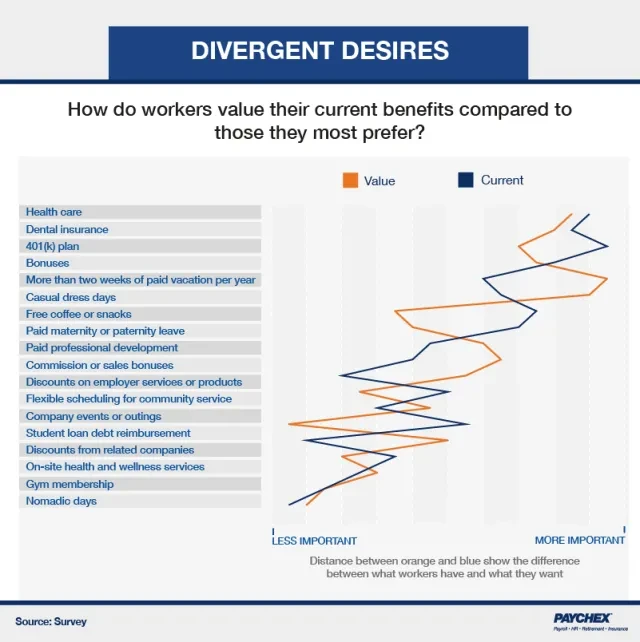
What work amenities do employers currently provide, and which are valued the most by employees?
Despite the suggestion that employees today favor alternatives to increased compensation as a form of recognition (and a tool of retention), most of our survey respondents felt the most important job incentive was regular bonuses. In fact, many rated bonuses above additional paid vacation and even health and dental insurance.
However, when ranked, bonuses were only listed eighth overall in salary benefits they received. Health care and dental insurance were listed as other common benefits, along with 401(k) plans, casual dress days, and free snacks. Least important to employees were nomadic days, or days wherein the employee is authorized to work outside the office at a location of their choice.
Take it or leave it
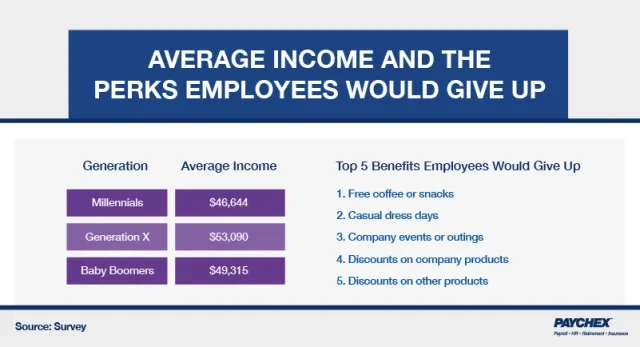
Next, we asked participants their salary and to rank the benefits they would be most willing to give up if they earned more money.
It turns out, millennials earn almost $47,000 a year, on average, while baby boomers make nearly $3,000 more at just over $49,000 annually. However, Gen Xers – those currently between the ages of 37 and 52 – make the most money in the U.S., averaging more than $53,000 a year.
We also found that low-cost benefits were ultimately seen as dispensable to employees – meaning they would give them up if they received additional compensation. Most would do away with free snacks or food as well as casual dress days, while others said company events and discounts on internal products or services would be easily forgotten if they were replaced with additional earnings.
While the intent of perks like these is to demonstrate appreciation and foster community within the workplace, as well as increased productivity, when used instead of merit-based compensation or bonuses they may fail to achieve their goal. One of the most important elements between an employer and their employees in creating a work culture supportive of employee satisfaction and retention is trust. For employees, trust means that their labor hours are priced fairly in accordance of the value they add to an enterprise.
For employers, trust means that workers are productive and professional. However, for employees, trust means fair treatment and a fair portion of the value they create for the company. Given the fact that low wage jobs are associated with higher rates of employee turnover, providing employees with a salary increase could reduce costs related to recruitment and training.
Perks big and small
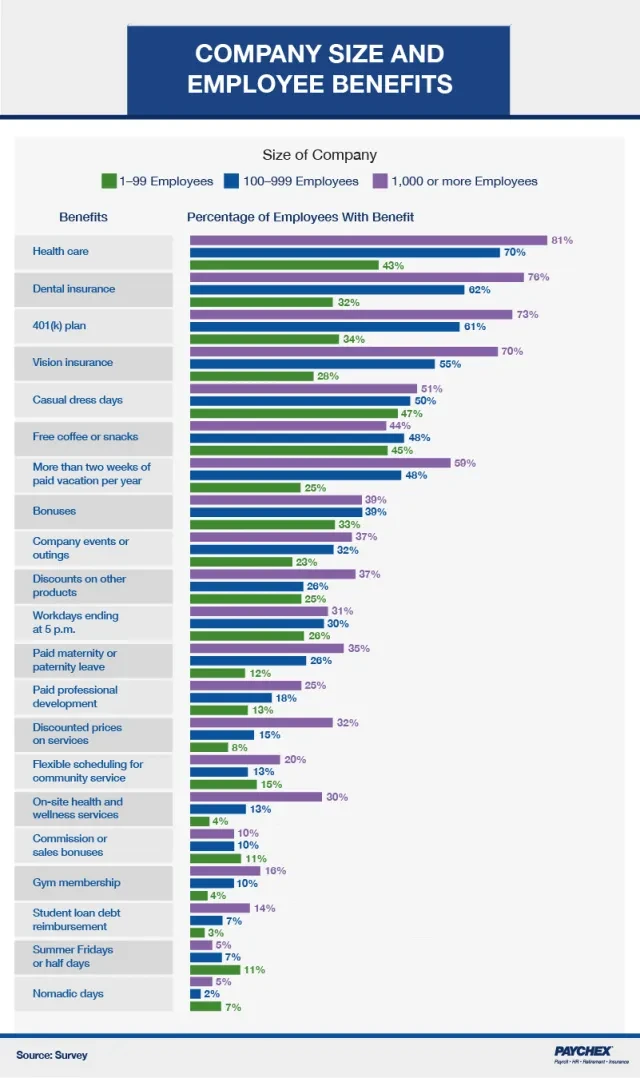
Depending on a company’s size, employers may not be able to offer certain high-cost benefits as easily as other businesses.
For those who work in companies with fewer than 1,000 employees, health care was the most commonly received workplace benefit – beating out dental insurance and 401(k) plan.
Specifically, we found employees in organizations with less than 100 team members were more likely to be offered casual dress days as well as free coffee or snacks before their employers offered them the opportunity to purchase health care. For organizations with more than a hundred but less than a thousand, this wasn’t the case, and for organizations with 1,000 or more employees), health care was the most commonly offered benefit, according to those surveyed.
However, we discovered that smaller-sized businesses were more likely to offer bonuses to their employees than those in medium- or larger-sized organizations. Bonuses were listed as the most important benefit to employees surveyed, edging out health care, dental insurance, and 401(k) plans.
Most attractive benefits, by generation
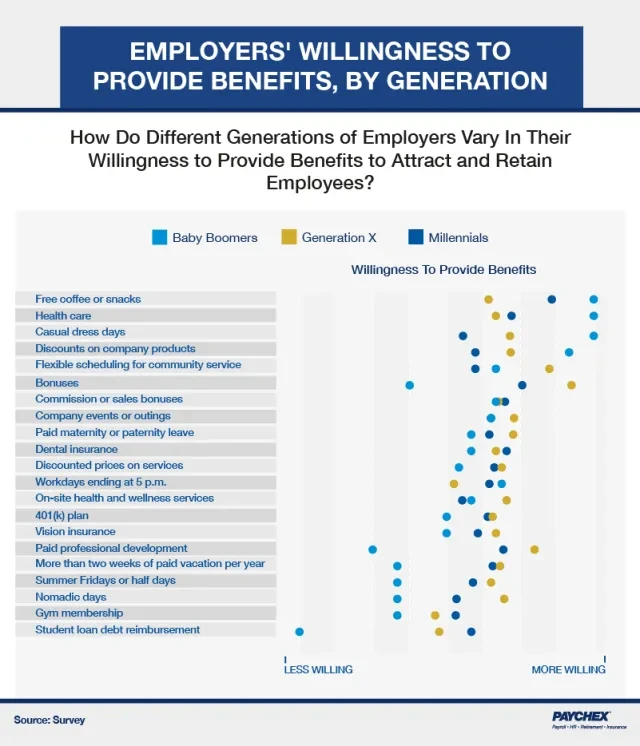
Today’s workplace is changing, and benefits that succeed in attracting and retaining top talent are also evolving. When we asked managers, owners, and partners the benefits they were willing to give their employees, we found some key differences between millennials, Gen Xers, and baby boomers.
Our research found that millennials were more willing to offer their employees commission and sales bonuses, paid gym memberships, and student loan reimbursement. Similarly, Gen Xers came out on top in areas like bonuses, paid maternity leave, and on-site health and wellness services.
Baby boomers, however, were the least likely to offer modern benefits aimed at keeping employees happy and appreciated. When it came to amenities like bonuses, nomadic days, and paid maternity leave, this generation was less likely to see the benefit. They were especially resistant to giving employees benefits like student loan reimbursement and paid professional development.
Creating a positive atmosphere
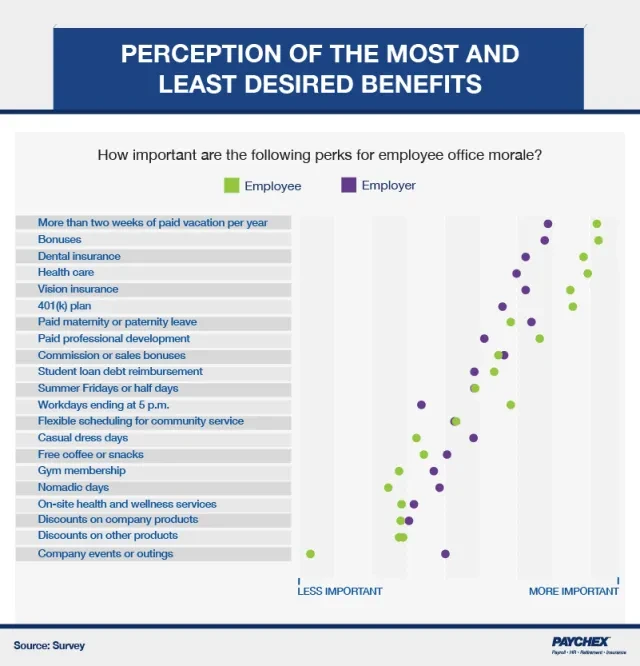
Employees and employers were then asked to rank the benefits they felt most contributed to employee morale and the benefits they’d give up to achieve a better sense of positivity around the office.
Employees told us that receiving monetary bonuses, additional paid vacation time, and health and dental insurance were the most important benefits to creating a strong sense of employee morale. In return, they said the benefits they were willing to give up to get more important amenities included company events and outings, nomadic days, gym memberships, and discounted products and services from other companies.
On the other side of the office, managers, owners, and directors believed it was paid vacations, followed by bonuses that most contributed to employee morale, and finally paid maternity leave and vision and dental insurance. As our study shows, leaders continue to undervalue the importance of monetary compensation. Additionally, despite its value to employees, employers rated health care just above lunch breaks in terms of morale-boosting importance.
Taking advantage of the system
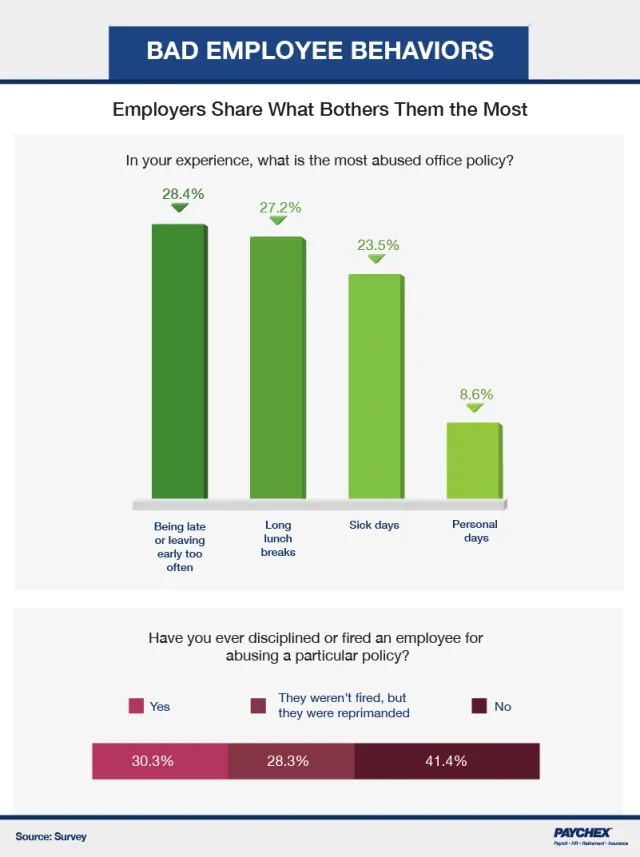
Of course, when you’re focused on workplace benefits rather than increased salaries or bonuses, it’s possible employees may feel taken advantage of and start to get a little loose with company policies. While not all workers have amenities like half days and nomad shifts, almost all have rules about appropriate use of company time. The last thing we asked managerial survey participants was to identify where employees take advantage of company policy the most and over 28 percent indicated employees arrived late or left early far too often.
Over 27 percent said they thought employees taking longer lunches than they should was the most frequently abuse policy, and more than 23 percent said it was people taking advantage of sick-day policies. Only around 12 percent said they worked in an environment where policies weren’t abused at all.
When we asked employers how they handled these and other digressions, over 30 percent reprimanded or fired an employee, while about 28 percent reprimanded an employee but didn’t fire them. Just over 41 percent did neither.
The truth of the matter
We found that certain perks like health care and vacation days were highly valued, but bonuses and compensation increases were the most likely to get employees excited. Employers, on the other hand, weren’t so quick to see the light. They were more likely to offer amenities like paid professional development and casual work days and told us other perks mattered more to their teams than money.
Paychex offers solutions to help you provide the benefits that matter to you and your employees. From retirement plans, to insurance for every stage of business, and simplified benefits management, Paychex gives you the experience, technology, and support you need to help you keep more of what matters most — your money, your time, and your people. Visit us at Paychex.com to learn more.
Methodology
We interviewed 100 business managers and owners and surveyed 1,000 entry- to mid-level employees.
Tags







